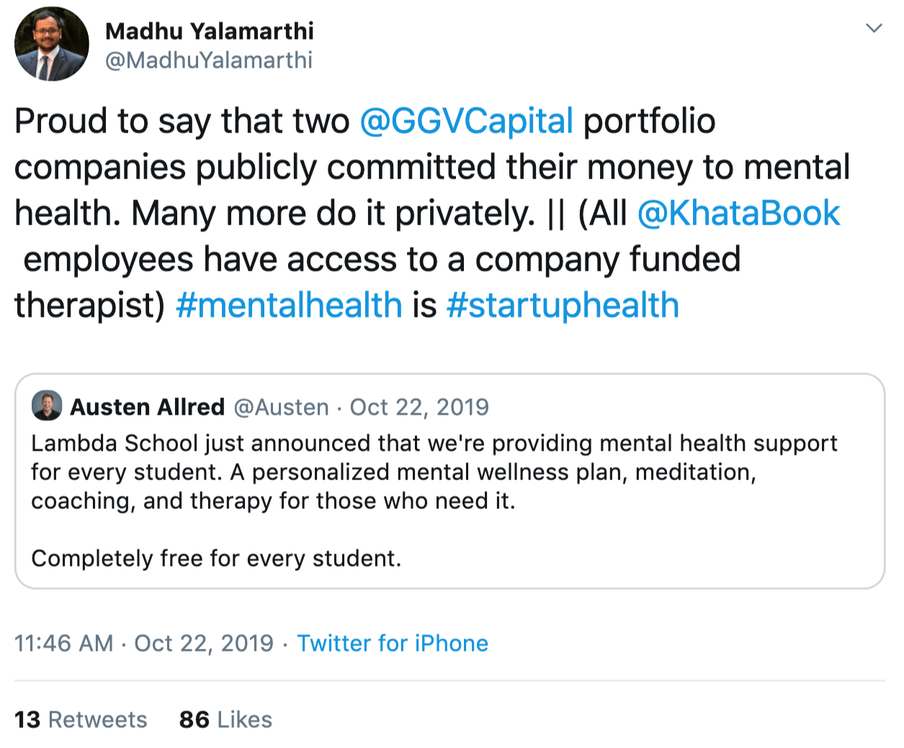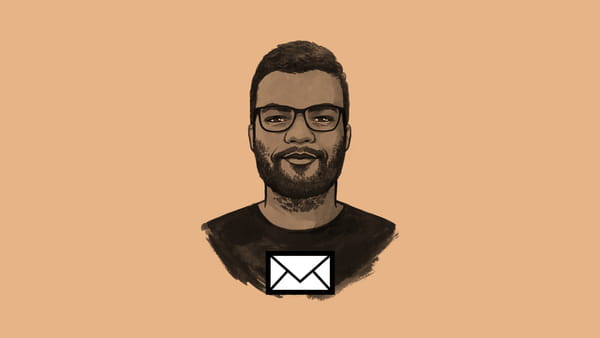Hi,
I recently discovered two companies that have started offering free therapy to their employees. First, Social Chain, an integrated social media company with offices in Berlin, Manchester, and New York, described by the Guardian as "Britain’s meme factory".
One of my readers pointed me to a LinkedIn post by Social Chain’s twenty-something co-CEO, Steven Bartlett. "For the last 3 years, we’ve provided free mental health therapy to all of our team members that wanted it for any reason. To say it’s had a transformative impact on those that have attended therapy is an understatement," Bartlett wrote.
In the beginning, the company found it hard to overcome stigma. Many employees wanted to take the offer but didn’t want to "worry" anyone. So last year, it made therapy opt-out instead of opt-in for everyone.
"I would go, our senior leaders will go and every team member’s scheduled mental health sessions would be in their calendar by default," said Bartlett.
From the first cohort that went through this, Bartlett says there’ve been zero opt-outs. And through his post, he even offered help to other companies who want to do something similar for their employees.
The space that Social Chain operates in – loosely the "creative" industry – was long infamous for peddling a bone-crushing work culture packaged as a bohemian lifestyle. It is refreshing to see a company taking ownership of its employees’ mental health and offering tangible support. A policy like this normalises the mental health conversation at the workplace and is a neat financial bonus, too, considering the lack of insurance cover for therapy.
Do note: Social Chain isn’t a cute startup. It is listed on the Dusseldorf Stock Exchange and had forecast consolidated revenues of €170m in 2019.
I have been trying to interview Bartlett because I have many questions about the nuts and bolts of this programme, how the company evaluates impact, and, most important, how it tackles any mental health problems that might be created by the workplace itself. That last one is a big reason why most employers don’t want to touch mental health in their HR initiatives – they are scared it will open up a Pandora’s box, and they will end up implicating themselves for much of the stress, anxiety, and burnout employees suffer.
So far, I haven’t managed to get time from the company, so if anyone from there ends up reading this, would you please spread the word?
The next company I discovered is KhataBook, a startup from India that helps small businesses digitise their bookkeeping and accept online payments. Recently, an investor in the company tweeted this:

I also heard from people in the startup ecosystem that the company, whose backers include the blue-chip venture capital firm Sequoia Capital, is serious about therapy, and that the intent flows right from the top management.
Once again, financial services is a space that’s teeming with unhealthy workplaces. For more perspective, it is one of the most fiercely contested industries for startups in India, where the government has been pushing to digitise the economy. I will be watching KhataBook closely and will also try to interview their founders and employees.
Meanwhile, let me leave you with a thought. Are we nearing a world where free therapy will become a more attractive perk than, I don’t know, employee stock options? Think about it. Employee stock ownership plans (ESOPs) are often brandished as a carrot before employees to keep them locked in, since you can only monetise your stocks after a certain period of time. They are widely used to prevent employee attrition; some startups also use ESOPs because they can’t pay high salaries.
At this stage of my career, if someone gave me free therapy, I’d take it with both hands. And I’d probably stay with them for life.
You? Will you take company-paid mental health support now instead of money in the future? Write to me.
Until next week.
 Would you like this newsletter sent straight to your inbox?
Subscribe to my weekly newsletter where I dismantle myths around Sanity, discuss the best ideas from our members, and share updates on my journalism.
Would you like this newsletter sent straight to your inbox?
Subscribe to my weekly newsletter where I dismantle myths around Sanity, discuss the best ideas from our members, and share updates on my journalism.

